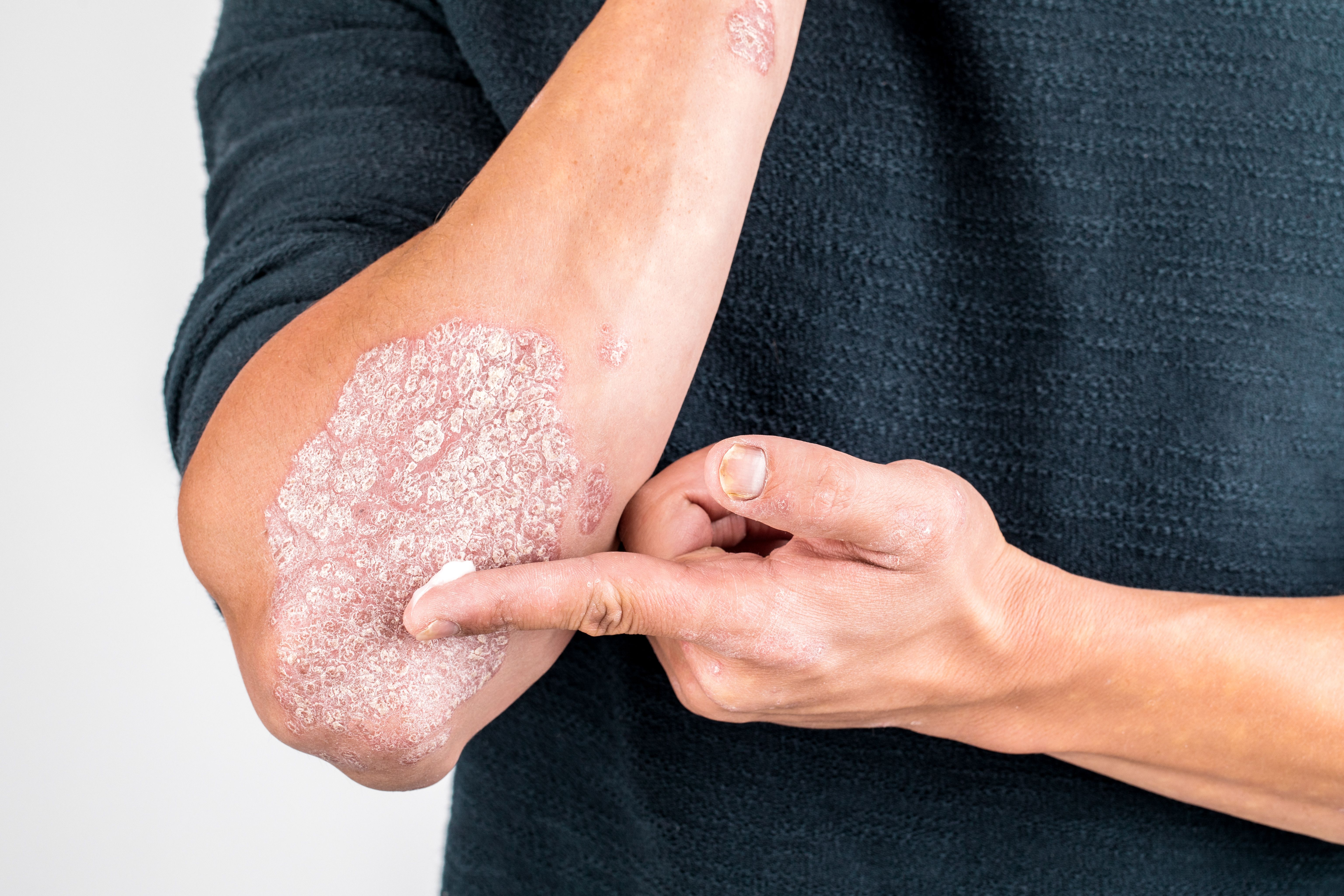- Case-Based Roundtable
- General Dermatology
- Eczema
- Chronic Hand Eczema
- Alopecia
- Aesthetics
- Vitiligo
- COVID-19
- Actinic Keratosis
- Precision Medicine and Biologics
- Rare Disease
- Wound Care
- Rosacea
- Psoriasis
- Psoriatic Arthritis
- Atopic Dermatitis
- Melasma
- NP and PA
- Skin Cancer
- Hidradenitis Suppurativa
- Drug Watch
- Pigmentary Disorders
- Acne
- Pediatric Dermatology
- Practice Management
- Prurigo Nodularis
- Buy-and-Bill
Article
Risankizumab outperforms ustekinumab in psoriasis trial
Author(s):
The IL-23 inhibitor risankizumab was superior to ustekinumab in a phase two trial of adult patients with moderate-to-severe chronic plaque psoriasis, researchers report. (©FreeBirdPhotos/Shutterstock.com)
The IL-23 inhibitor risankizumab was superior to ustekinumab in a phase two trial of adult patients with moderate-to-severe chronic plaque psoriasis, researchers report in the New England Journal of Medicine.
This trial was designed as a direct comparison of ustekinumab (Stelara, Janssen Biotech) which targets p40 by inhibiting IL-12 and IL-23; and, risankizumab (Abbvie-066), a human IgG1 monoclonal antibody that targets p19 by way of IL-23.
“What was most interesting from the phase 2 program was that patients given one small dose (of risankizumab), who were essentially in a control group had response rates similar to that of ustekinumab - which is generally an effective treatment for many people,” according to Melinda Gooderham M.D., a study author and medical director of the Skin Centre for Dermatology in Peterborough, Ontario.
Previous trials have shown that ustekinumab is associated with significant efficacy and safety in psoriasis and in October, the U.S. Food and Drug Administration approved ustekinumab for patients 12 years and older with moderate to severe plaque psoriasis.
The Papp et al. study included 166 patients between 18 and 75 years with moderate-to-severe chronic plaque psoriasis with or without psoriatic arthritis and with a Psoriasis Area Severity Index score of 12 or higher.
“Although these findings are preliminary, the data suggest that selective blockade of interleukin-23 through the inhibition of the p19 subunit rather than p40 provides a more complete inhibition of interleukin-23 activity, potentially resulting in greater efficacy in the treatment of plaque psoriasis at the doses used,” wrote Kim A. Papp, M.D., Ph.D., and colleagues in the April 20 issue of the journal.
RISANKIZUMAB VS USTEKINUMAB
“There are many safe and effective therapies for the management of psoriasis currently available. However, we seem to be 'fine-tuning' our treatments and developing treatments that are highly effective with a very clean safety profile. Risankizumab is one of these therapies.” - Melinda Gooderham M.D.
This was a 48-week trial in which patients were randomly assigned to receive subcutaneous injections of risankizumab (a single 18 mg dose at week 0 or 90 mg or 180-mg dose at weeks 0, 4, and 16) or ustekinumab (45 or 90 mg, according to body weight, at weeks 0, 4, and 16). The primary end point was at least a 90 percent reduction from baseline in the Psoriasis Area and Severity Index (PASI) score at week 12.
Investigators found that 64 of 83 patients who received either dose of briakinumab experienced a 90 percent or greater decrease in the PASI score as compared to 16 of 40 patients who received lower or higher doses of ustekinumab, a difference that was statistically significant at p<0.001.
Moreover, more patients who were administered risankizumab achieved a 100 percent decrease in PASI compared to those who received ustekinumab (45 percent vs. 18 percent). Response to therapy was largely maintained up to 20 weeks after the last dose of risankizumab was administered.
Indeed, investigators saw for the first 16 weeks of the trial that one dose of the experimental therapy produced comparable efficacy to induction dosing of ustekinumab.
“I don't think anyone was expecting to see these results with this dose, and the other doses studied (90 and 180 mg) provided higher levels of response than we have seen with other therapies with no new safety concerns,” says Dr. Gooderham. “It was a very exciting trial to be involved in.”
The study permitted the use of low-potency topical corticosteroids, but that did not that detract from the robustness of the data, according to Dr. Gooderham.
Serious side effects occurred in patients who received a single dose of risankizumab, the 90-mg dose of risankizumab, and patients who received ustekinumab. No serious side effects occurred in the higher-dosed risankizumab patients.
“There are many safe and effective therapies for the management of psoriasis currently available. However, we seem to be 'fine-tuning' our treatments and developing treatments that are highly effective with a very clean safety profile. Risankizumab is one of these therapies ... targeting IL-23 seems to be the key to treating psoriasis,” Dr. Gooderham said.
COMORBIDITIES
Psoriasis is a condition associated with co-morbidities like obesity, hypertension, diabetes mellitus, hypercholesterolemia, and the metabolic syndrome, and it may be that a targeted therapy such as risankizumab may offer an avenue to manage these comorbidities, according to Dr. Gooderham.
“This study was not designed to look at nor was it long enough to comment on comorbidities,” explains Dr. Gooderham. “We know, however, that targeting IL-23 is also being investigated for the treatment of psoriatic arthritis and Crohn’s Disease, so there is the possibility of also treating these comorbidities we see in the psoriasis population.”
Dr. Gooderham pointed to a published study which showed a positive effect of risankizumab on the management of moderate-to-severe Crohn’s Disease after 12 weeks of treatment.
“Studies targeting IL-23 with risankizumab for psoriatic arthritis are ongoing,” notes Dr. Gooderham, who is an investigator for a study on risankizumab in the treatment of psoriatic arthritis.
REFERENCES
Papp Ka, Blauvelt A, Bukhalo M, et al. “Risankizumab versus Ustekinumab for Moderate-to-Severe Plaque Psoriasis,”New England Journal of Medicine. April 20, 2017. DOI: 10.1056/NEJMoa1607017
Feagan BG, Sandborn WJ, D’Haens G, et al. “Induction therapy with the selective interleukin-23 inhibitor risankizumab in patients with moderate-to-severe Crohn’s disease: a randomized, double-blind, placebo-controlled phase 2 study,”The Lancet. Published online April 12, 2017. DOI: 10.1016/S0140-6736(17)30570-6.






